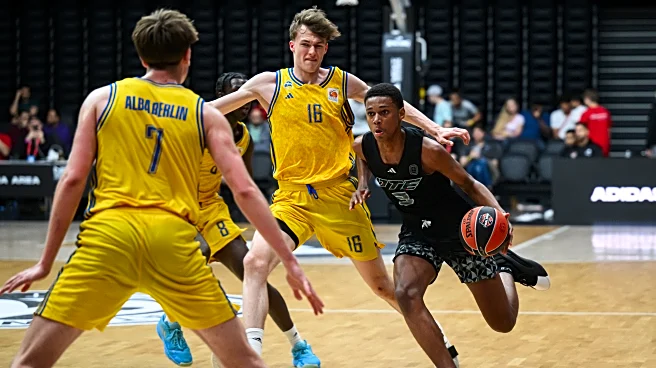What's Happening?
The Philadelphia Eagles are facing scrutiny following a disappointing loss to the New York Giants, with key players and analysts highlighting issues in the team's offensive strategy. Lane Johnson, a prominent player, has publicly criticized the predictability of the Eagles' offense, suggesting that opponents can easily anticipate their plays. Despite having a talented roster, the Eagles have struggled with efficiency, leading the NFL in three-and-out rates. Offensive coordinator Kevin Patullo has been identified as a key figure in these challenges, with calls for more variety and creativity in play-calling. The Eagles' inability to adjust during games has been a recurring theme, contributing to their recent defeats.
Why It's Important?
The Eagles' offensive struggles have significant implications for their season and the broader NFL landscape. As a team with high expectations, their inability to perform consistently could affect their playoff prospects and overall standing in the league. The criticism from within the team suggests potential internal discord, which could impact team morale and performance. Additionally, the Eagles' challenges highlight the importance of adaptability and innovation in NFL play-calling, serving as a case study for other teams facing similar issues. The situation underscores the need for effective leadership and strategic adjustments to leverage the team's talent effectively.
What's Next?
The Eagles are expected to reassess their offensive strategy during their upcoming mini-bye week. This period provides an opportunity for the coaching staff, including Nick Sirianni and Kevin Patullo, to implement changes aimed at improving play-calling and execution. The team may explore new formations and plays to increase unpredictability and effectiveness. Stakeholders, including fans and analysts, will be watching closely to see if the Eagles can address these issues and improve their performance in future games. The team's response to this criticism will be crucial in determining their trajectory for the remainder of the season.
Beyond the Headlines
The Eagles' offensive challenges may have deeper implications for the team's culture and leadership dynamics. The public criticism from players like Lane Johnson suggests potential friction between the coaching staff and players, which could affect team cohesion. This situation also raises questions about the role of player input in strategic decisions and the balance between coaching authority and player autonomy. Long-term, the Eagles' experience may influence how NFL teams approach offensive strategy and player-coach relationships, potentially leading to shifts in league-wide practices.











